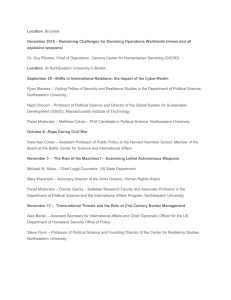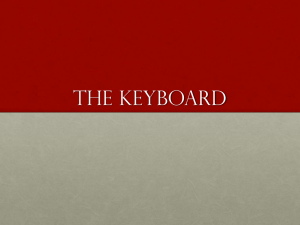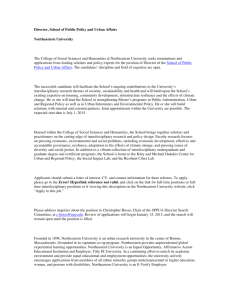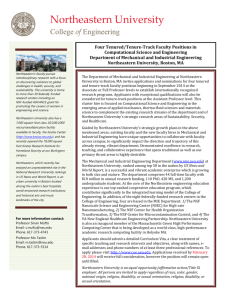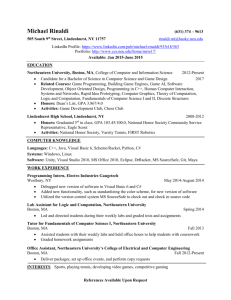letter - Center for Constitutional Rights
advertisement
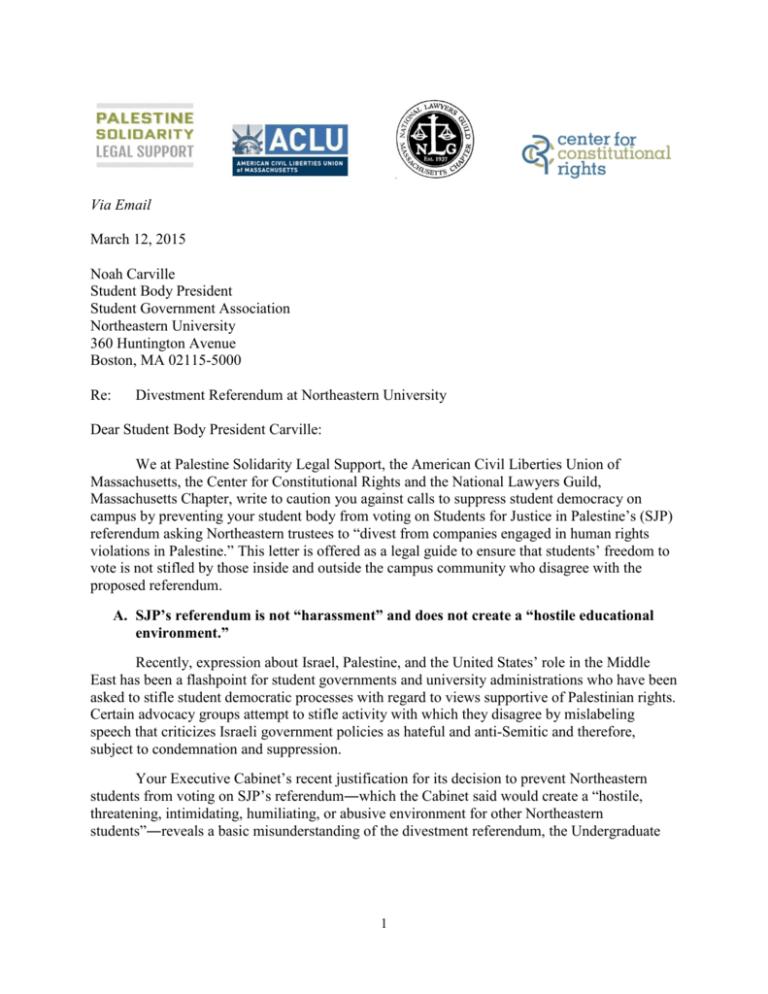
Via Email March 12, 2015 Noah Carville Student Body President Student Government Association Northeastern University 360 Huntington Avenue Boston, MA 02115-5000 Re: Divestment Referendum at Northeastern University Dear Student Body President Carville: We at Palestine Solidarity Legal Support, the American Civil Liberties Union of Massachusetts, the Center for Constitutional Rights and the National Lawyers Guild, Massachusetts Chapter, write to caution you against calls to suppress student democracy on campus by preventing your student body from voting on Students for Justice in Palestine’s (SJP) referendum asking Northeastern trustees to “divest from companies engaged in human rights violations in Palestine.” This letter is offered as a legal guide to ensure that students’ freedom to vote is not stifled by those inside and outside the campus community who disagree with the proposed referendum. A. SJP’s referendum is not “harassment” and does not create a “hostile educational environment.” Recently, expression about Israel, Palestine, and the United States’ role in the Middle East has been a flashpoint for student governments and university administrations who have been asked to stifle student democratic processes with regard to views supportive of Palestinian rights. Certain advocacy groups attempt to stifle activity with which they disagree by mislabeling speech that criticizes Israeli government policies as hateful and anti-Semitic and therefore, subject to condemnation and suppression. Your Executive Cabinet’s recent justification for its decision to prevent Northeastern students from voting on SJP’s referendum―which the Cabinet said would create a “hostile, threatening, intimidating, humiliating, or abusive environment for other Northeastern students”―reveals a basic misunderstanding of the divestment referendum, the Undergraduate 1 Code of Conduct, and the law.1 The Supreme Court has held that “speech on public issues occupies the highest rung of the hierarchy of First Amendment values, and is entitled to special protection.”2 Boycotts “to bring about political, social and economic change” involve speech, association and petition activities unquestionably protected under the First Amendment.3 The United States itself is a product of a colonial boycott against British, Irish, and West Indian goods, issued by the First Continental Congress on October 20, 1774, in an effort to avoid war, persuade British lawmakers, and influence British public opinion.4 Since then, our country has had a long tradition of boycotts and divestment campaigns, from pre-Civil War protests against slavery to the Montgomery bus boycott led by Dr. Martin Luther King, Jr., to boycott and divestment campaigns against apartheid South Africa. Indeed, SJP has said its divestment referendum takes inspiration from the divestment campaign against the apartheid regime in South Africa. Had a decision such as this been made during that era, Northeastern University may never have divested from South African apartheid.5 Moreover, speech like that of SJP’s at issue here is neither anti-Semitic, nor anti-Jewish.6 Allegations that expression criticizing the state of Israel, standing alone, is harassment or intimidation that targets and creates a hostile educational environment for Jewish students on campus on the basis of race or national origin have been soundly rejected by the U.S. Department of Education’s Office for Civil Rights (OCR).7 In August 2013, OCR closed three investigations into the University of California Berkeley, Irvine, and Santa Cruz that had been opened under Title VI of the Civil Rights Act of 1964.8 The investigations were prompted by complaints that Jewish students were deprived of an equal educational opportunity because 1 Northeastern Executive Cabinet of the Student Government Association External Memorandum to Students for Justice in Palestine, February 20, 2015 at 2 (“Cabinet Memo”) (internal quotations removed). Our understanding is that on March 2, 2015, the Cabinet reversed its earlier decision on procedural grounds, allowing signature collection to go forward. 2 Connick v. Myers, 461 U.S. 138, 145 (1983) (internal quotations and citations removed). 3 NAACP v. Claiborne Hardware Co., 458 U.S. 886, 911 (1982). 4 Cong. Journal, 1st Cont’l Cong., 1st Sess. (Oct. 20, 1774), reprinted in 1 Journals of the Cont’l Congress 75-81 (Worthington C. Ford et al. eds., 1903); see also David Ammerman, In the Common Cause: American Response to the Coercive Acts of 1774 (1974). 5 According to Northeastern’s website, the University’s Board of Trustees voted to divest from companies with interests in South Africa in 1986 (http://library.northeastern.edu/archives-special-collections/findcollections/northeastern-history/timeline/1980s). 6 We strongly object to the notion that any ethnic or religious group monolithically holds a single political opinion about this subject, as such complaints suggest. To the contrary, Jewish communities, like Christian, Muslim, and other communities, are diverse and are home to a spectrum of perspectives on this and other issues. 7 A federal judge has also dismissed a lawsuit making similar allegations. See Felber v. Yudof, 851 F.Supp.2d 1182, 1188 (N.D. Cal. 2011) (“A very substantial portion of the conduct to which [the complainants] object [i.e., speech critical of Israel] represents pure political speech and expressive conduct, in a public setting, regarding matters of public concern, which is entitled to special protection under the First Amendment.”). 8 DOE’s determination letters in these three cases, explaining its legal findings, can be downloaded at the following URLs: UC Berkeley (http://bit.ly/doeucb); UC Santa Cruz (http://bit.ly/doeucsc); UC Irvine (http://bit.ly/doeucirvine). 2 campus events created a “hostile environment” by featuring criticism of United States foreign policy towards Israel/Palestine and criticism of Israel’s policies towards the Palestinians. OCR rejected these complaints, finding that such activities “constitute[] expression on matters of public concern directed to the University community. In the university environment, exposure to such robust and discordant expressions, even when personally offensive and hurtful, is a circumstance that a reasonable student in higher education may experience. In this context, the events that the complainants described do not constitute actionable harassment.”9 B. A Function of Free Speech Is To Invite Dispute, Create Unrest, and Even Stir People to Anger. The Executive Cabinet’s recent decision to prevent Northeastern students from exercising their democratic right to vote on a human rights referendum, also appears to be based on the belief that there is no room for controversy at the ballot box,10 and that ironically, the issue was too important to allow the student body to vote on.11 The use of the vague and highly subjective concept of “civility” has been at the center of a number of recent campus controversies. For example, University of California, Berkeley Chancellor Nicholas B. Dirks faced criticism in September 2014 after issuing a statement pitting “civility” against “freedom of speech.” Not only did faculty respond fiercely, but the 9 See UC Santa Cruz and UC Berkeley determination letters. (Emphasis added.) Cabinet Memo at 2-3 (citing opinions from students at other universities who believed divestment initiatives similar to Northeastern SJP’s were “incredibly divisive,” attacked Israel, condemned Israel, unfairly targeted Israeli human rights abuses, that a few supporters of initiatives “grew emotional” and that senators reported receiving emails “voicing various opinions” leading one student senate chair to give her closing remarks “in tears.”). 11 Cabinet Memo at 3 (“We, the Executive Cabinet, believe that this issue is of paramount importance . . . [and] that the ‘yes or no’ setting of the ballot platform and student legislation is wholly insufficient to allow for this level of discourse.”). 10 3 Chancellor’s statement was roundly rejected in the media,12 forcing him to backtrack in a subsequent clarification.13 Such scrutiny and limitation of speech on this issue not only violates free speech principles, but the foundational principles of the democratic process. The Supreme Court has long held that: [A] function of free speech under our system of government is to invite dispute. It may indeed best serve its high purpose when it induces a condition of unrest, creates dissatisfaction with conditions as they are, or even stirs people to anger. . . That is why freedom of speech, though not absolute, is nevertheless protected against censorship or punishment, unless shown likely to produce a clear and present danger of a serious substantive evil that rises far above public inconvenience, annoyance, or unrest.14 The Executive Cabinet’s unsupported rationale for barring the SJP divestment referendum contravenes the free speech principles Northeastern claims to profess. Moreover, it appears that certain groups disagreeing politically with SJP and other activists have engaged in a widespread effort to brand all students at Northeastern and other universities who advocate for Palestinian rights and divestment initiatives as anti-Semitic, uncivil, targeting a specific group, or potentially harmful to a university community. These allegations are factually and legally incorrect, as evidenced by the U.S. Department of Education’s rejection of these types of complaints. What would be harmful to a university community is the restricting of the discussion of human rights and international law likely to be engendered by the referendum proposed by SJP. See Greg Lukianoff, Free speech at Berkeley-so long as it’s ‘civil’, WALL STREET JOURNAL, Sep. 8, 2014, http://online.wsj.com/articles/greg-lukianoff-free-speech-at-berkeleyso-long-as-its-civil1410218613; Michael Hiltzik, Free speech, civility, and how universities are mixing them up, LOS ANGELES TIMES, Sep. 9, 2014, http://www.latimes.com/business/hiltzik/la-fi-mh-free-speech-civility20140909-column.html; Colleen Flaherty, The problem with civility, INSIDE HIGHER ED, Sep. 9, 2014, https://www.insidehighered.com/news/2014/09/09/berkeley-chancellor-angers-faculty-members-remarkscivility-and-free-speech; David Palumbo-Liu, Civility is for suckers: Campus hypocrisy and the ‘polite behavior’ lie, SALON, Sep. 10, 2014, Peter Schmidt, Please for civility meet cynicism, CHRONICLE OF HIGHER EDUCATION, Sep. 10, 2014, http://chronicle.com/article/Pleas-for-CivilityMeet/148715/.http://www.salon.com/2014/09/10/civility is for suckers campus hypocrisy and the pol ite behavior lie/; Eugene Volokh, Free speech and civility at universities, WASHINGTON POST, Sep. 9, 2014, http://www.washingtonpost.com/news/volokh-conspiracy/wp/2014/09/09/free-speech-and-civilityat-universities/. 13 Ken White, Follow-up: U.C. Berkeley Chancellor Nicholas Dirks Gets Free Speech Right This Time, POPEHAT, Sep. 12, 2014, http://www.popehat.com/2014/09/12/follow-up-u-c-berkeley-chancellornicholas-dirks-gets-free-speech-right-this-time/. 14 Terminiello v. Chicago, 337 U.S. 1, 4-5 (1949) (internal citations and quotations removed). 12 4 C. The Student Senate Should Allow SJP’s Referendum to Go Forward Universities’ increased scrutiny and censorship of speech critical of Israel in response to pressure from groups opposed to such speech harms all campus community members, especially those who are interested in exploring the crucial issue of Israel/Palestine. It threatens to shut down robust debate on one of the most urgent foreign policy, moral and political questions of our time. We acknowledge these situations sometimes present difficult questions given the deeplyheld beliefs and passions of students and community members. It is precisely in these circumstances, however, that student government must steward an open campus forum and be cognizant of “the dependence of a free society on free universities,” as the U.S. Supreme Court has said.15 Debate, disagreement, and free expression—including divestment referendums such as the one submitted by SJP—embody the highest values of a free university As a representatives elected to “serve[] as the voice of the undergraduate student body” Northeastern’s Student Government should live up to the highest ideals of free speech and student governance. We urge you to stand firmly in support of student democracy, and to refuse to accede to demands to prevent students from voicing their opinion on this critical issue. Thank you for your prompt consideration of this matter. Sincerely, Radhika Sainath Staff Attorney Palestine Solidarity Legal Support Cooperating Counsel Center for Constitutional Rights Maria C. LaHood Senior Staff Attorney Center for Constitutional Rights David Kelston Co-Chairperson National Lawyers Guild Massachusetts Chapter Sarah Wunsch Staff Attorney ACLU of Massachusetts cc: Joseph C. Aoun, President; Ralph C. Martin II, Senior Vice President and General Counsel 15 Sweezy v. New Hampshire, 354 U.S. 234, 262 (1957). 5
